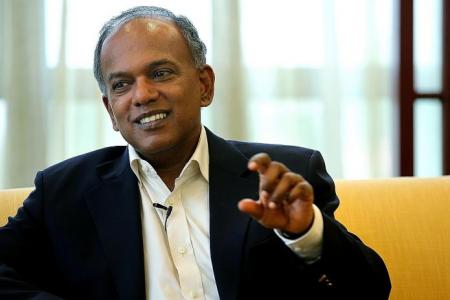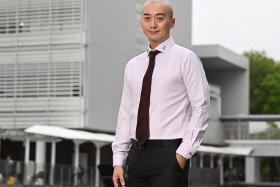Law Minister: Killer drivers on drugs are ‘reprehensible’
In the first of a two-part interview, Law and Foreign Affairs Minister K. Shanmugam speaks to ELIZABETH LAW (lawsm@sph.com.sg) on a variety of issues, including the punishment for those driving under the influence of drugs and the possibility of a public defenders' office
One took high amounts of prescription drugs and drank alcohol. The other took a cocktail of drugs.
They then got in their cars and drove at high speeds on expressways, where they ended up killing a total of five people.
When Law Minister K. Shanmugam was asked about these killer drivers, he did not hold back his contempt for their irresponsible behaviour,
He said: "These two people (were) driving under the influence, they (were) driving super fast, they (were) not in control, and they killed people on the roads.
"That is seriously reprehensible."
As to whether Singapore's laws for serious traffic offences were tough enough compared to some other countries, Mr Shanmugam was more equivocal.
He said that a number of factors went into deciding the penalty for an offence, including the frequency of the crime and the level of deterrence needed.
The New Paper published a commentary recently asking whether it was time for tougher penalties as one of the killer drivers, Toh Cheng Yang, 36, was given the maximum sentence of five years' jail and a 20-year driving ban for causing death by dangerous driving.
Some netizens felt he had got off lightly after killing a Singaporean man, his South Korean girlfriend and her parents while speeding under the influence of drugs on the Central Expressway in the early hours of National Day in 2013.
In a TNP online poll, 96.9 per cent of respondents believe that tougher laws are necessary for those who drive dangerously under the influence of alcohol or drugs.
Court documents said Toh had taken Nitrazepam, which is a tranquiliser, and toxicology reports showed he had five to 15 times the amount prescribed. He had also drunk alcohol before driving.
In imposing the maximum sentence, District Judge Low Wee Ping called Toh's actions "one of the most reprehensible traffic offences".
Last Wednesday, the other driver, Ong Heng Guan, 25, was jailed for 15 months and banned from driving for eight years under the same charge.
He killed a lorry driver in December last year while driving at twice the speed limit on the Bukit Timah Expressway.
Officers responding to the scene noted that Ong had slurred speech and an unsteady gait.
He told the officers he had taken a cough mixture, Panadol Active and flu medication, and painkiller for his wisdom tooth.
He also admitted to taking an oval orange pill, bought in Geylang, about 30 minutes before the accident as he was feeling depressed.
In countries like the UK, US and Australia, drivers who kill people on the roads while intoxicated or on drugs can be charged with manslaughter which carries heavy jail terms, including life imprisonment.
Mr Shanmugam said: "The laws must suit the society.
"Driving under the influence of drugs and killing people, or driving under the influence of drugs in a dangerous way, which can potentially kill people, I think most people would say is very serious, and the judge's comments (in Toh's case) ought to be taken very seriously."
However, he added: "I don't want to be commenting on whether the sentence provided for in the law is adequate because I think that's something under the purview of (the Ministry of Home Affairs).
"But (the offence is) something completely unacceptable and I feel very strongly about it."
On religious harmony

INSULTING: Teenage blogger Amos Yee was found guilty in May of insulting Christianity and uploading an obscene image online. - TNP FILE PHOTO
Calling Singapore a rule-based society, Mr Shanmugam said that as a multi-racial and multi-religious society, the country needs to take a strong stance against those who debase another religion.
"(To) protect our religious harmony, we take a very strict view. For example, should we allow the burning of the Quran or the Bible on the basis of freedom of speech?" he asked.
When someone insults religion in Singapore, the people expect the Government to take a firm stance, he added.
"If society as a whole says it's okay to insult Christianity (and other religions), then the laws will change. But if we think it's important we keep those rules, then we should," Mr Shanmugam said.
Touching on teenage blogger Amos Yee, he said there has been misconception that the youth is being prosecuted for insulting former Prime Minister Lee Kuan Yew when, in fact, his charges are to do with obscenity and insulting Christianity.
Yee, 16, was found guilty in May of insulting Christianity and uploading an obscene image online. A third charge of posting an insulting video clip online containing remarks about former Prime Minister Lee Kuan Yew was withdrawn.
Mr Shanmugam said the next question is what the teen's sentence should be. Several factors, including the individual, his age and his mental condition, need to be taken into consideration.
"(The Singapore judiciary) is a civilised system that takes into account a variety of factors (before handing down a sentence), including your state of mind," he added.
Yee's case is scheduled to be heard again on Monday, when Judge Jasvender Kaur will consider sentencing options.
On criminal legal aid
While he did not rule out the possibility of Singapore introducing public defenders to represent those who cannot afford to hire a lawyer, Mr Shanmugam said we should take it one step at a time and first look at how the enhanced Criminal Legal Aid Scheme (Clas) is working out.
Under the enhanced system, which he launched in May, the Government has pledged up to $3.5 million a year to fund Clas.
This means the system can help up to 6,000 people a year, compared to fewer than 500 previously.
The Government had previously tried to stay away from this because it meant using public funds to both prosecute and defend the same individual.
Introducing a public defenders' office, which is practised in countries such as the United States and Brazil, would further formalise a system where those accused of criminal offences are entitled to a lawyer to defend them.
But Mr Shanmugam noted that the needs of society are always evolving and this is something his Ministry would be keeping an eye on.
"In the context of all of that, you need to be careful with the sort of spending of public money that takes place," he said.
"It's not impossible, I'll never say it's impossible. It's a matter of whether we think it's necessary and what we can afford."
On tackling terrorism

WANTED TERRORIST: Abu Bakar Al-Baghdadi, leader of the Islamic State in Iraq and Syria (ISIS). - PHOTO: AFP
The lone wolf attacker is one of the Government's greatest concerns, said Mr Shanmugam.
Speaking on the issue of terrorist threats in the region, the Minister said there were three areas of approach - at the community level, the governmental level and working together with our international partners.
On the part of the Government, it is doing what it can to "detect, identify and neutralise" such individuals, he said.
"The task is enormous and extremely complex and difficult because if people form networks, you can try to break it up.
"But if an individual (the lone wolf) takes out a knife and does something, how do you prevent it?" he asked.
Singaporeans also need to realise how serious the situation is because it is no longer just about attacks happening in countries far away.
"Most people have not really understood how serious the situation is. There is a tendency to just look at the news and say well, it's somewhere else in the world. It won't really happen here," Mr Shanmugam said.
"We've arrested people (for terrorism activities), people who were planning to do things, and (attacks have) happened in our neighbouring countries.
"So I think the key is for Singaporeans to realise this is serious, and everyone has a role, not just the Government," he said.
Mr Shanmugam highlighted the efforts of the Malay Muslim community, whose religious leaders have taken a strong stance against deviant teachings.
"(The community leaders) have come forward to stand shoulder to shoulder with other religious groups (and) secular groups, because our common identity as Singaporean is very important," he said.
Get The New Paper on your phone with the free TNP app. Download from the Apple App Store or Google Play Store now



